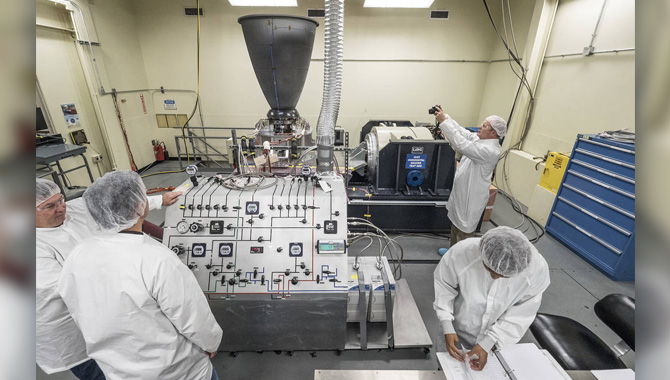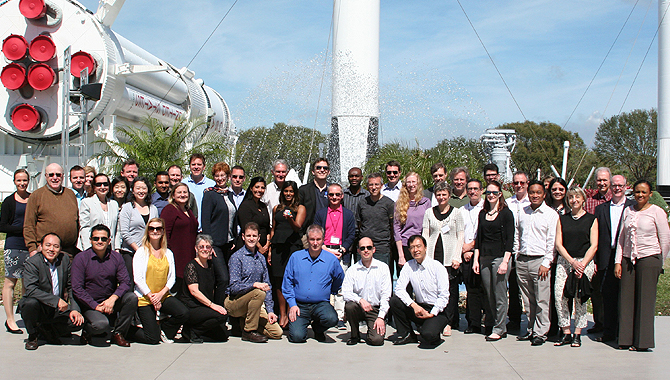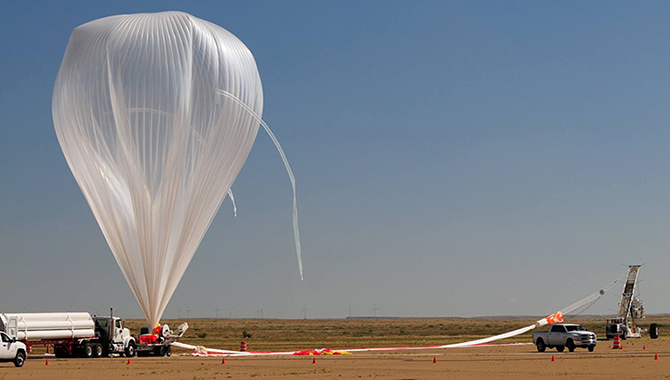
In June 2016, engineers at Johnson Space Center conducted a vibration test involving an Orbital Maneuvering System engine that is destined for use on Orion’s service module.
Photo Credit: NASA
Some engineers become project managers, while others remain more hands-on for the duration of their careers. Both, it turns out, can benefit from project management training.
The traditional perspective is that those on a track to become project managers, or who are already managing projects, should pursue formal project management training. In contrast, engineers who are content in their technical fields have no need for such training because the more limited scope of their work does not call for project management knowledge.
“Not true,” says Dr. Dale Crossman, an expert in professional development whose career has focused on working with engineers and managers. Engineers who choose to remain hands-on can accrue significant professional benefits from attending courses that promote an understanding of project management tools and techniques. These tools and techniques can support the successful completion of every engineer’s activity or project, big or small.
APPEL News sat down with Crossman to learn more about why this is true and how project management tools and techniques can contribute to career success for NASA engineers.
APPEL News: You’ve worked alongside engineers for 55 years, though you’re not one yourself. What has your involvement with them been?
Dale Crossman: I started working with engineers at the National Security Agency in 1962. Since then, I’ve worked with engineers, project managers, and those in general management. My work has always been in the areas of organization development, management development, project management development, and team development. I currently work with NASA project managers and their international colleagues when I conduct the International Project Management (IPM) course.
APPEL News: In your experience, what drives engineers in their work?
Crossman: At the most fundamental level, engineers are interested in something physical. They’re interested in some form of structures. These can include roads and commodes, going to the moon, making a plane fly faster or building a space station, etc. Engineers become passionate when learning about new or different things. This, in turn, enhances the world’s understanding of that thing. They then try to find a way to operationalize that new knowledge in a hands-on contribution to science—or to the ability to develop a science. The process they go through is actually science itself. A thought pops into their mind: I wonder if or How come or What if I…and they begin to explore the possibilities. As they reflect on them, they may come up with a concept to test. Unproved, untried, but a conceptualization of what might be possible. Then they build a model or do something else to test it. When they try it, it either works or it doesn’t. If it doesn’t work, they analyze why it didn’t work, modify it, and test again. They may find out that it didn’t work because there’s some new science that has to be developed first. That’s the engineer’s life—and the scientist’s life. Conceptualizing, researching, building models, testing, evaluating the results, and then finding ways to apply it to their organization’s mission or to the world in general. This has been my experience of what engineers and scientists are occupied with throughout their lives.
APPEL News: What have you discovered about them that leads you to believe the majority of engineers can benefit from project management training?
Crossman: Engineers often prefer hands-on activities, particularly early in their career. Some will want to continue in that mode for the remainder of their careers. Others may make a transition to preferring the challenge of managing successive levels of projects. In either case, engineers can benefit from an understanding, and use, of project management tools and techniques. These tools and techniques can be critical for their mission success.
APPEL News: How can project management tools and techniques support the work of engineers?
Crossman: Every engineer manages his or her daily work. However, as the system they work with becomes more complex, the knowledge and skills required to be successful also become more sophisticated and complex. Eventually, the system becomes so large that some structure must be provided to manage the increased number of factors.
That structure, in my mind, is what we call project management. Now they will become more engaged with justifying the dollars required, the contractors to support them, the procurements required, the international regulations that govern their relationships with foreign nationals, managing the potential risks, and many more things they may never had experience with before. Working with experienced colleagues can assist them in developing the requisite tools and techniques. That is necessary, but it is not enough. Formal training can increase the speed of their development.
APPEL News: What specific skills can a hands-on engineer get out of project management training?
Crossman: Project management is a process that has an incredible number of subsets, often requiring different tools and techniques. Think about writing proposals. For a big project, you need to tell other people what you need to do and how much it’s going to cost in a way that will make them want to say, “Let’s do it and here’s the money.” Project managers have to do that every time they need to change something. They must justify what they need in a way that people will understand and accept. Any engineer must communicate effectively, in a timely manner, with their manager, letting them know what is needed to complete their part of the project.
APPEL News: So proposal writing is a valuable tool across a range of engineering jobs. It sounds like communication skills are important, too.
Crossman: They are critical tools. How do you get people on board to support you? These days, it’s not enough, as it was when Ford started his organization, to say: “Do it and I’ll pay you five bucks a week to do it.” And people did it: they did exactly what, how, where, and when they were told to do. People don’t do that anymore. There has to be some way to become aware of and skilled in engaging people in the work process in order to access their ideas and assure their commitment to getting the job done. Communication skills to support those interactions are vital for everyone on a project team.
So communication skills matter, and so does a willingness as well as an ability to communicate—in other words, an individual’s assertiveness. Everyone must be able to speak up, and feel comfortable doing so. Anyone who has a thought about something that could go wrong—a potential risk and a new approach that might mitigate that risk—must surface that idea and talk about it with their work group and/or manager. Some people aren’t in this position often: it’s not part of the expectations their boss has of them or they have of themselves. But they need to know that they can do it when necessary. And if there are issues on the project team, it’s not just the project manager who has to manage those issues. Team members must also learn to deal with the issues or to anticipate them before they occur.
APPEL News: What other project management skills are useful to a broad range of engineers?
Crossman: Decision-making training is invaluable. When you make a decision and do something, you’d better be able to say, “This is why I did it” in a way that makes the boss understand why it was the right decision and that you had the right rationale when you made that decision. And requirements writing: getting the requirements down clearly upfront makes the whole team function better down the line.
So communicating, analyzing risk, decision analysis, learning how to develop a plan, how to negotiate, how to effectively present your ideas or the status of your work—these are some of the project management tools in which everyone should be skilled to do their jobs effectively. There are many more. In my experience, the knowledge and skill required for understanding and using these tools at NASA can be found in the Project Management & Systems Engineering Competency Model as well as in the courses and programs represented in the APPEL Catalog.
APPEL created the Competency Model based on input from experienced project managers and systems engineers who established what people in each discipline need to know and do in order to develop professionally. There are 18 separate project management competencies and 17 systems engineering competencies, as well as 14 joint requisite competencies. I highly encourage engineers to explore the Competency Model to fully understand the knowledge and skills they need to excel in their careers.
APPEL News: It sounds like these tools and techniques help people manage up as well as manage down.
Crossman: Manage up, manage down, manage sideways. In addition to communicating and working with your boss and people you supervise, you have to work effectively with colleagues and interdependent others: that is, people who you rely on for something—people you go to for counsel, budget, permissions, materials, interpretations of different laws, etc. It has to do with managing relationships with people you can’t do without. That happens at every level, whether you’re a manager or a hands-on engineer.
The whole evolution of project management training has been interesting. It’s happened during my lifetime at NASA: identifying and organizing needed knowledge and skills required for project management and systems engineering as formal training programs, as opposed to totally relying on the individual manager’s interest and competence in guiding the development of his staff. It’s been fascinating to watch it emerge, to see the tools and techniques become formalized so that they’re clear to everyone. In the past, we didn’t talk about project management—we talked about management. Some managers didn’t do the kinds of things that were required for them to be successful. Some of them were successful because they had a role model or manager interested in their development and provided a lot of personal oversight. But now, with the formalized tools and techniques, everyone has access to knowledge and skills that will work. And everyone should be aware of and able to take advantage of that.
APPEL News: So your advice to hands-on engineers who aren’t project managers is that they can benefit from understanding and implementing project management tools and techniques. Do you have any advice for early-career engineers?
Crossman: In addition to the availability of excellent training programs, and having a proactive manager who is interested your career development; in the final analysis, you have to be responsible for your own career. Get the development experiences you need, and that includes learning these engineering and project management tools we’ve been talking about. Search out the most experienced individuals or lessons learned in what you want to learn and spend time with them and build your political networks. Additionally, the advice I’d give any young person, for any point in their career, is to follow your heart and stomach. If your stomach or your heart feels tight when you think about doing your job, find another one. Go someplace else. If your heart and stomach feel light, if you feel relaxed and excited about doing your work, you’re probably in the right spot or close to it. Ultimately, if it feels right, it probably is right for you.
__
Dale Crossman developed and directs APPEL’s International Project Management (APPEL-IPM) course. He has provided organizational development services and human resource development programs to government, industrial, educational, and healthcare systems around the world. From 1979-1995, Dr. Crossman was responsible for developing many of the project management, organization, and manager/executive-development programs at NASA. He received the NASA Exceptional Service Medal in 1988.
Visit the Project Management & Systems Engineering Competency Model.
Explore the APPEL Catalog.










